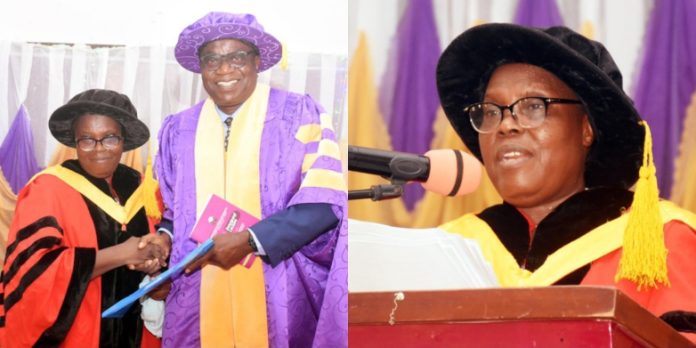
Professor Mary Fasoranti, an expert in development economics, says only agricultural-based growth and labour-intensive technology have the capacity to reduce poverty in Nigeria.
Prof. Fasoranti stated tho on Tuesday, May 28, 2024, while delivering the 24th Inaugural Lecture of Adekunle Ajasin University, Akungba Akoko, Ondo State, titled, “Rural Poverty: Incapacitating the Hydra-Headed Monster.”
Prof. Fasoranti underscored the significant role rural economies play in national development, stressing that “the prevalence of poverty is a major issue undermining the role of the rural economy in the overall development of the nation.” Despite numerous attempts to combat rural poverty, she noted that such efforts have yielded “no visible, lasting results.”
She noted that, The economic growth must occur on a consistent basis and such must address the needs of the poor, increase their access to basic services, employment, income generating opportunities and reliable market for output. In other words, economic growth must be inclusive and the gains from growth must flow down to the poor masses. It should be noted that the pattern and stability of economic growth matter much in dealing with poverty. Capital intensive and urban based growth cannot reduce poverty. Only agricultural- based growth and labour- intensive technology have the capacity to reduce poverty.”
Highlighting the role of leadership, she urged leaders at various levels to show commitment to improving the plight of the poor. “There is an urgent need for leaders at various levels to cultivate the willingness and commitment to improve the plight of the poor,” she said.
The Inaugural Lecturer emphasised the importance of inclusive economic growth. She stated, “Economic growth must occur on a consistent basis and such must address the needs of the poor, increase their access to basic services, employment, income-generating opportunities, and reliable markets for output.”
Addressing income and gender inequalities, Prof. Fasoranti remarked, “Deliberate effort should be made to reduce income and gender inequalities. Where these types of inequalities exist, poverty will remain unabated no matter how many laudable policies are put in place.”
While highlighting the need for empowering the poor through education, credit facilities, entrepreneurial training, and skill acquisition as vital strategies, she suggested the re-emphasis of population control policies, such as the four-children-per-family policy introduced by General Ibrahim Babangida.
The professor also underscored the need for community-based poverty reduction programmes, stressing the importance of community involvement in setting priorities and objectives. “Direct involvement of the poor in the identification, design, and implementation of poverty reduction policies will guarantee adequate, efficient management and equitable distribution of resources,” she explained.
She called for substantial investment in the agricultural sector and rural infrastructure, including roads, electricity, healthcare, and irrigation. “No nation can thrive without adequate attention to agriculture and the rural areas,” she asserted.
Prof. Fasoranti also addressed the urgent need to end herder-farmer clashes and other security issues, noting that “adequate security networks should be put in place to ensure the safety of farmers and their farmlands.”
The Vice Chancellor of Adekunle Ajasin University and Chairman on the occasion, Prof. Olugbenga Ige, had earlier in his Welcome Address, commended the Inaugural Lecturer for her significant contributions to academia and society. He commended Prof. Fasorantis dedication to advancing knowledge in the field of economics and societal development.














